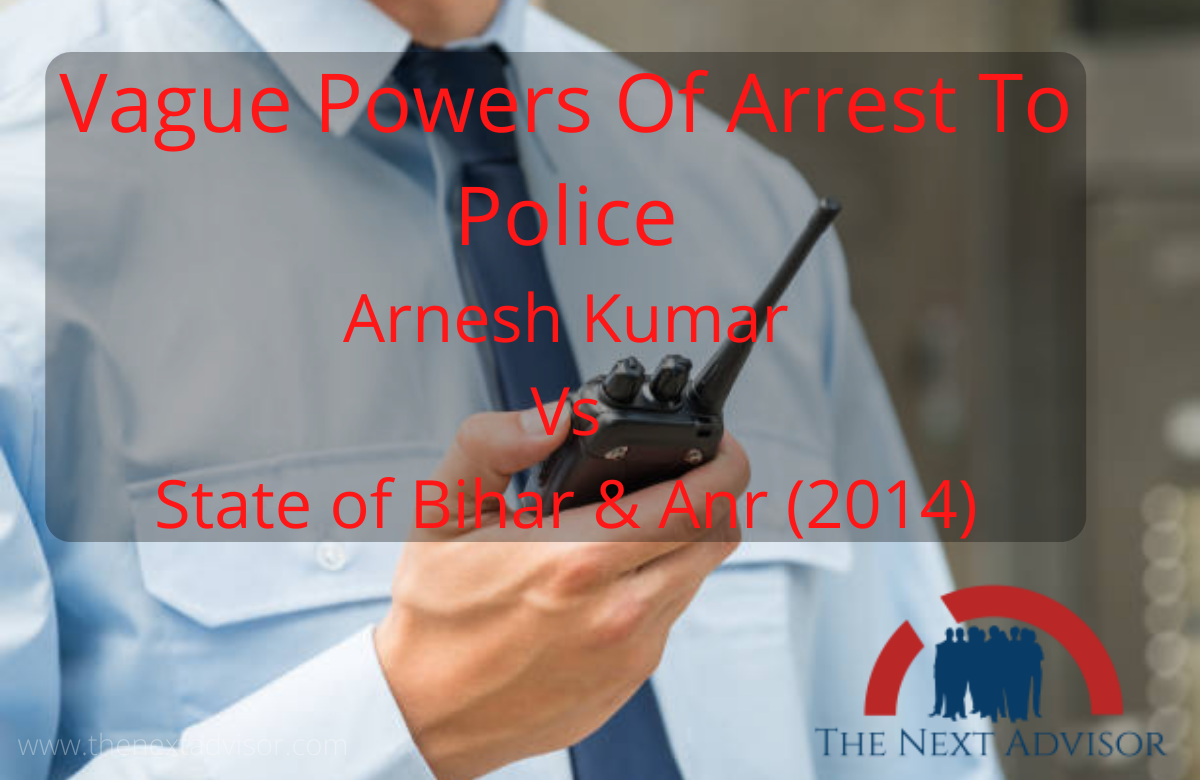Police have vague powers of arrest over any person but there are some limitations. When and Why arrest is required is well explained by Supreme Court in Arnesh Kumar Vs State of Bihar. (Please refer Arnesh Kumar Vs State of Bihar & Anr (2014) ) Let us see What is the Vague powers Of Arrest to Police in detail.
Right to Life
•Life and liberty are sacred freedom of our sanctified Constitution under Article 21, but it has been hampered by the exploitation, done by the police, of the already vast powers given to them by the Code of Criminal Procedure ( Cr . PC ) enacted by the Parliament in 1973.
• A widely discussed and contentious issue has been the constant abuse of personal liberty and constitutional rights by the government through their own retained rights for the apparent ‘ protection of the public ‘.
• Media and court records display instances of such abuse by the police force; the same force that has been tasked as the keepers of our peace and protectors against evil.
Vague powers Of Arrest to Police
• Cr.PC contains the arrest power provided to the police officers such as an arrest without a warrant (section 41 ), arresting someone who fails to identify themselves and their place of residence, a search of premises where the arrested entered or is believed by the officers to have entered, seizing personal property such weapons and so on.
•Cr. P.C is also flexible in terms of the discretion to arrest a person for several types of offenses such as bailable, non-bailable, cognizable, and non-cognizable offenses.
• A problem that can be recognized through a careful perusal of Cr. P.C is the existence of vague and very general language when it comes to conditions and prerequisites for arrests.
• Words like reasonable and credible suspicion or investigation prior to an arrest are very subjective in nature and can, in reality, provide the police officer vast discretion.
Apex Court Views in Vague powers Of Arrest to Police
Arnesh Kumar v. the State of Bihar ( 2014 ) is a landmark judgment, as it imposed checks and balances on the powers of the police before an arrest under section 498 – A of IPC can be done which deals with dowry harassment cases.
The Court held about Vague powers Of Arrest to Police
• No arrests should be made on the basis of the offense being non-bailable and cognizable. The manner of the arrest should not be casual and based on a mere allegation made against a person. The arrest should be preceded by initial investigations by the officer to assess the genuineness of the complaint.
• Proper facts and reasons should be presented before a Magistrate by the officer effecting the arrest within 24 hours of the arrest. The Magistrate in turn is to be satisfied with that condition precedent for arrest under Section 41 Cr. P.C has been satisfied and it is only thereafter that he will authorize the detention of an accused.
• Police officers must ensure that they do not arrest the accused unnecessarily and Magistrates do not authorize detention casually and mechanically. The police officer shall be provided with a checklist for arrest that comes under section 41 of the CrPC and they shall forward the checklist duly filed and furnish the reasons and materials which necessitated the arrest.
• On top of arrest powers, the decision not to arrest an accused must also be forwarded to the Magistrate within two weeks from the date of the institution of the case. Authorizing detention without recording reasons as aforesaid by the judicial Magistrate concerned shall be liable for departmental action by the appropriate High Court.
• Not only Section 498 – A of the I.P.C. or Section 4 of the Dowry Prohibition Act, but this judgment will apply to all matters where the offense is punishable with imprisonment for a term which may be less than seven years or which may extend to seven years; whether with or without fine.
Court summarized the issues within the system with the following statement: Issues in Vague powers Of Arrest to Police
• “Arrest brings humiliation, curtails freedom, and casts scars forever. Lawmakers know it so also the police. There is a battle between the lawmakers and the police and it seems that the police have not learned its lesson the lesson implicit and embodied in CrPC.
• It has not come out of its colonial image despite six decades of Independence; it is largely considered a tool of harassment, and oppression and surely not considered a friend of the public. need for caution in exercising the drastic power of arrest has been asserted time and again by the courts but has not yielded the desired result.
• Power to arrest greatly contributes to its arrogance so also the failure of the Magistracy to check it. Not only this, the power of arrest is one of the lucrative sources of police corruption. The attitude to arrest first and then proceed with the rest is despicable. It has become a handy tool for police officers who lack sensitivity or act with oblique motives.
Irony
•On paper, this seems like a step forward to a more accountable police force but in practice, it is far from the case. The amended provisions of Cr. P.C and the directions issued by the Supreme Court were not being abided by the police officers and the noncompliance has had consequences such as Dr. Rini Johar v. the State of Madhya Pradesh ( 2016 ) where Justice Dipak Misra and Justice Shiva Kirti Singh called out the officers in question and their disregard of the law and personal liberty while ruling in favor of the petitioners and awarding a combined compensation of 10 lacs.

























